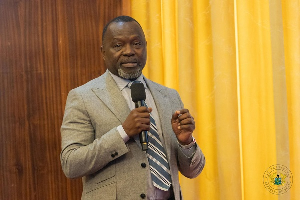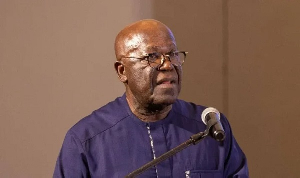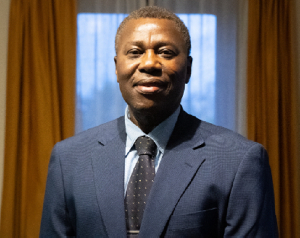In this short piece, I want to give some food for thought on the institution of chieftancy in Ghana.
So the story began that years ago, an individual or a group thereof settled on several pieces of land in different places of present-day Ghana and called it theirs. This title to property could be justified by the classic rule of first possession whereby individuals, starting from the original position of self-possession, acquire unowned things by simply taking possession of them. Based on the rule of first possession, colonialism, wars, etc which are practices based on the notion of ?might is right? cannot be justified. In the case of chieftancy and monarchy, it is families or groups related by blood who are claiming the right to these pieces of land based on the rule of first possession.
Traditionally, our chiefs or royal families have not had a development-oriented mentality where the wealth of the land was distributed fairly for the benefit of all. The wealth was typically concentrated in the hands of the members of the royal family. This mentality stems from the rule of first possession. They believed that the land was theirs (i.e., the royal family) and hence they were under no obligation to spread the wealth around.
You could be a citizen of a village but you were not entitled to the resources of that village because you did not belong to the royal family of that village. If chiefs continue to have this mentality, and I believe some of them do, then in what sense can we integrate chieftancy into our system of national government where resources move from the central government to the royal families for the development of everyone? Ghanaian chiefs have sold the lands in their towns, regions, and villages over the years. But what do they have to show for these sales in terms of investing these resources for the economic development of their communities. Typically, only the members of the royal families have benefited from the sale of land.
Indeed, if we accept and respect our current system of democracy, then there is no reason why chiefs and members of royal families should be given any priority over the distribution of the nation?s resources. They could be consulted on national policies and economic plans, but they shouldn?t necessarily be given priority in the distribution of resources. Why do we have District Chief Executives, regional ministers, etc? It is important to note that these people are accountable to the president and, for that matter, the entire nation. Our chiefs are not accountable to the president.
If our chiefs require resources for their benefit and members of the royal family only, then this is clearly unacceptable. A Dagarti, Ashanti, Ewe, Nzema, Ga, etc who is not a member of the royal family of his/her village should also be a beneficiary of this resource. In other words, these resources must be invested by the chiefs in ?public goods?: schools, clinics, roads, etc. But if the chiefs are willing to do that, then what will be the job of our elected officials, ruling governments, DCEs, etc? Our chiefs should accept to be ceremonial leaders and custodians of our traditions but leave the distribution, transfer, and use of our resources to our elected officials. And if only our elected officials would use this power wisely by managing the economy competently and distributing the gains fairly and equitably, we shall all be happy.
Of course, there are benefits of public goods, transfers, and investment which go to a specified group of people of a specific geographic location. For example, Nigerians and only Nigerians, enjoy certain goods and services, rights, and privileges by virtue of being Nigerians (i.e., their forefathers and foremothers settled on that land several years ago). Therefore, the rule of first possession applies to several places in the entire world. But there ought to be practical limits to the application of this rule. In our case, the multiplicity of chiefs and royal families makes the application of the rule of first possession very cumbersome.
There are public goods like the police, national army, the courts, law and order, etc which are more efficiently provided by a central government rather than a disparate and uncoordinated set of local governments that ignore the externalities they impose on each other.
Like the Royal Families in countries like the UK and the Netherlands, an ideal arrangement would have been to support the Royal Families in Ghana through public funds (taxation) and allow them to be ceremonial heads. But our situation is complicated by the fact that we have too many royal families (too many chiefs) and we are poor. We cannot go down this route.
The chiefs of Ghana should have done what all progressive people do: economically develop their communities FIRST, and then find a way to extract some of the surplus from any such economic growth. This was what the British monarchy did. They accomplished this by harnessing resources from abroad (the colonies) and from within. Subsequently, they constitutionally protected their interests by ensuring that their survival will continually and partly depend on public funds (i.e., taxes). For as long as the British economy booms, the monarchy will be fine. Note that even if you earn royalties from land, the value will be very low, if you do not create the economic conditions for the lessees to develop the land. Our chiefs did not do this. Some of them even sold us into slavery.
A search at the official website of the British royal family revealed the following:
1.?Head of State expenditure is the official expenditure relating to The Queen's duties as Head of State and Head of the Commonwealth.
Head of State expenditure is met from public funds in exchange for the surrender by The Queen of the revenue from the Crown Estate.
source: http://www.royal.gov.uk/output/page433.asp
2.?The four sources of funding of The Queen, or officials of the Royal Household acting on Her Majesty's behalf, are: the Civil List, the Grants-in-Aid for upkeep of Royal Palaces and for Royal travel, the Privy Purse and The Queen's personal wealth and income.?
?The Civil List is the sum provided by Parliament to meet the official expenses of The Queen's Household so that Her Majesty can fulfil her role as Head of State and Head of the Commonwealth.
The Civil List dates back to the Restoration of the Monarchy in 1660, but the current system was created on the accession of George III in 1760. In that year it was decided that the whole cost of civil government should be provided by Parliament in return for the surrender of the hereditary revenues (principally the net surplus of the Crown Estate) by the king for the duration of the reign.?
Sources: http://www.royal.gov.uk/output/page314.asp; http://www.royal.gov.uk/output/Page361.asp.
Let me indicate that I am not a fan of the British royal family or of any royal family. I believe in meritocracy not aristocracy.
It must be noted that the bulk of our development problems has nothing to do with the exclusion of chiefs in our development plans. This may have played a role. But I think it is only a minor one. The bulk of our problems stems from corruption, dictatorship, and the mismanagement of funds at the national level.
The problem with chieftancy is trying to integrate it into a system of democratic government. This institution gets in the way of our regional ministers, DCEs, etc. It is like trying to run a federal system of government where premiers and governors of provinces, regions, states are appointed for life.
Recently, the Asantehene was made the chancellor of KNUST. I do not have any problems with this honor bestowed on the Asantehene. Chancellors of universities are typically figureheads or titular heads. They do not directly participate in the day-to-day admnistration of the university. I hope that the chancellorship of KNUST is a ceremonial position.
There are hardcore traditionalists who will disagree with me. To these traditionalists, my message to you is as follows: if you want to keep chieftancy, please tell our chiefs to spread the wealth around. A progressive nation is a just nation.
Let me end by repeating this statement: Our chiefs should accept to be ceremonial leaders and custodians of our traditions but leave the distribution, transfer, and use of our resources to our elected officials. And if only our elected officials would use this power wisely by managing the economy competently and distributing the gains fairly and equitably, we shall all be happy.
-------------------
For those of you interested in the legal, political, economic, and philosophical foundations of private property, the rule of first possession, the redistributive power of the state, etc you may read the following books:
1. Epstein, Richard A (1985). Takings: Private Property and the Power of Eminent Domain, Harvard University Press, Cambridge.
2. Epstein, Richard A (1995). Simple Rules for a Complex World, Harvard University Press, Cambridge.
3. Nozick, Robert (1974). Anarchy, State and Utopia, Basic Books, New York.
4. Rawls, John (1971). A Theory of Justice. Belnap Press of the Harvard University Press, Cambridge.
*This article was originally written on October 31, 2005. The writer, J. Atsu Amegashie, is an economics professor at the University of Guelph, Canada: http://www.uoguelph.ca/~jamegash















